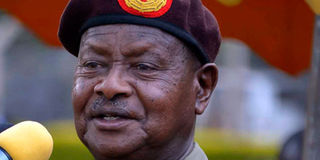Museveni has the credentials to be Africa’s de facto leader

President Museveni
What you need to know:
- Nagging question. I have a nagging question though: Why did Africa’s perceived ideological guru, according to his bush war compatriots, a fighter who always looked ahead of everybody and planned for unforeseen contingencies, fail to ‘adequately’ factor the demographic gift of the youth into his strategic plans?
When I hear of the simplicity of argument that President Museveni does not have the credentials for enthronement as Africa’s most committed pan-Africanist and de facto leader, I would be at no loss to decide that the artificers are totally negligent of their national duty.
As Edmund Burke once said, “there is no qualification for government, but virtue and wisdom, actual or presumptive’. The trouble with pursuing that line is that apart from the most dogmatic of his admirers, people now seem to be revising their perceptions. The retraction could be more of a mistake than the original assertion!
Is it because the ostensible ends for which he has consistently advocated pan-Africanism have been more enduring than the means by which he has reportedly resorted to in trying to achieve political unanimity?
There are occasions when people should be permitted to feel that they are not being forced into submission. A scale of values by which ultimate triumphs become more important than the methods used to pursue those triumphs often resurrects the ghost of Machiavelli haunting the country’s political historiography.
A curious relationship between the mythology of Gen Museveni as a national hero and the reality of his pan-Africanism exists. Even his harshest detractors would be at pains to dissociate him from the advocacy of using ‘African solutions to African problems’, seeking development partnerships not development aid, value-addition instead of export of raw materials.
Heroic myths in nation-building, revolution in politics and the role of the reality of his compatriots having shaded blood during the revolution, which he spearheaded, in Uganda’s national imagination, distortion of facts entailing invention of things that may never have happened; are too abstract to base an evaluation of credentials for heroism on. Yet humanity is incapable of sympathising with the issue of boasting ‘mastery of violence’ unless the imagination humanizes it.
Distilling history out of obsolete political doctrines; examining what light new ideologies throw on how Africa’s current challenges and problems can be solved is feasible. Individualistic ideological constructs have allegedly been used to re-write history to make them part of the flow of pan-African history, but that is not the focus of this conversation.
What is important is to identify whose political thoughts have best animated economic and social development in Africa; as an ardent advocate of African development Museveni’s have. He has promoted regional and international peace and security with specific focus on South Sudan, Somalia, the Great Lakes Region and DRC, among others. He has also promoted trade and facilitated negotiations with the developed countries regarding technology transfer with specific emphasis on EAC, GLRC, WTO, COMESA, AGOA, TICAD, FOCAC, EU, BRICS, Ring States, Middle East; he negotiated regional integration, concluded bilateral and multilateral cooperation frameworks. Never mind that some of these are inconsistent with the legacy of the Nkrumahist pan-African doctrine of economic determinism.
Economic factors draw people together than politics which divides them. Economic development can best be driven by a combination of economic cooperation between African countries and rational planning, which involves organisation that combined with military efficiency is a harsh method for dealing with the African populace. Iron discipline bordering on military discipline is sometimes fraught with the risk of excessive intolerance of political dissent; which is contradicted in a true democracy.
The people’s obedience can depend more on persuasion through public diplomacy than the colonial police academy doctrine to shock and awe. A scrupulous milito-planner, pan-Africanism’s primus inter pares [first among equals] Museveni isn’t a new convert to economic and commercial diplomacy, which anyone conversant with African priorities cannot afford to ignore.
I have a nagging question though: Why did Africa’s perceived ideological guru, according to his bush war compatriots, a fighter who always looked ahead of everybody and planned for unforeseen contingencies, fail to ‘adequately’ factor the demographic gift of the youth into his strategic plans?
Mr Baligidde teaches at Uganda Martyrs University-Nkozi.




